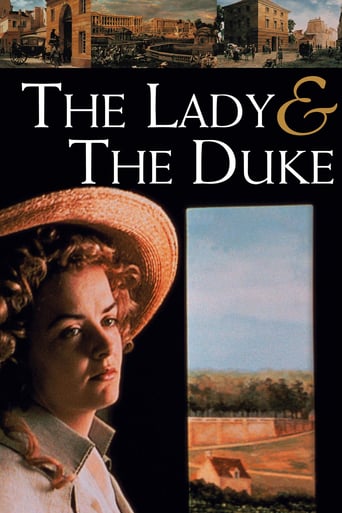Henry Fields
Rohmer strays from his usual portraits of french middle class to tell this costume drama about the difficulties of an aristocrat lady during the french revolution. What's more attractive about "La Anglaise..." (apart from the story itself) is the fabulous aesthetics that Rohmer has achieved. The images have been digitally decorated too make them look like baroque pictures. In some moments you can't really say whether your watching a movie or a series of pictures in Louvre Musseum. Every shot is like a piece of art.*My rate: 7.5/10------------------------------ --------------------------------
ctrei
If I only had one camera that was accidentally glued to the floor, enough film for only one take of each shot, and then lost all that film and had to scrounge up some bucks to buy a few digital video tapes, and was forced to make an over-2-hour movie about the French Revolution, and also didn't have any sets and had to have my 4-year-old autistic son paint the backgrounds, and also the only actors I could find were the people who didn't make the auditions of that year's soap opera, and I was also forced to not use any music in the entire film, and also the zoom function on the camera didn't work except for one time when it accidentally started zooming in and couldn't stop, oh and if I hated my audience, then I might make something kind of like this awful, yet mistakenly hilarious, Hell-worthy waste of time. The almost grand looking but completely fake looking backdrops reminded me of some of George Lucas' latest creations, which made it so much more disappointing because through the whole movie, there was that little glimmer of hope in the back of my mind that the film would climax in a lightsaber duel/space laser battle. I don't mean to spoil the movie for those who haven't seen it, but that's not how it ends. The only thing I can think of that wasted more time than watching this movie was writing this review. Peace.
DaveTheNovelist (WriterDave)
Every so often a movie comes along that knocks me down a notch and reminds me that my taste in films I seek out to watch isn't always impeccable. I normally would stay away from stuff like this, but I was duped by some glowing reviews and the Rohmer pedigree.There's an initial and intriguing novelty to the production where Rohmer essentially superimposes the actors onto painted (digital) back-drops of revolution era France. This quickly wanes and becomes about as interesting as watching the paint dry on a paint by numbers scene. What we're left with is a boring and stuffy film about aristocrats in 18th century France. None of the characters are appealing or sympathetic. The pace is so languid, the dialogue so arduous, and suspense is clearly a foreign concept to Rohmer, that I ended up not caring whose head rolled, who was harboring who, or what the devil the revolution was supposed to be about. The movie would've greatly benefited from some semblance of emotional build-up and a music score (there's some fine classical music used at the very end). Despite being so "talky", the film plays much like a silent film, and the worst kind of film at that, a dull and uninteresting film about infinitely interesting subjects. Only the most astute French historians will find anything to take from this film, as it dose seem to paint well known events from a new angle (the Lady is English and a royalist). Otherwise, avoid this yawner at all costs unless you are suffering from insomnia (I dozed off twice).
tedg
Spoilers herein.I am a newcomer to Rohmer?s work, having seen only two before this. But this is so intelligent, so imaginative, I must rush to see what else I can. He works with the nature of the telling by focusing on the manner of telling. Here, he selects a subject that concerns artifice and abstraction (the aristocratic manners with a former mistress, and theideals of the French revolution). And he presents them according to his understanding of how artificial and abstract they are.The presentation is shocking. If you haven?t seen it, he has flattened all the sets by literally using paintings with people superposed. This is done inside as well where all the walls are flat and have texture painted on them. Doors, cupboards also. We are transported to a theatrical world where the actors not only perform for us, the characters perform for each other. Very clever notion that reminds us how synthetic ?normal? film is.At the same time, we have Rohmer?s constant fixation with how abstract notions interact with reality. Here we have the French revolution. Unlike that which took place in North America the decade before, this was pure ideals not at all practicalized. (Dr Franklin was appalled.) And it was heavy with opportunists and posers. The notion of how things were, how they should be, how one should comport, what constitutes a ?nation,? or ?liberty? -- all abstractions. Presented in the form of dialog between two people who could not shape it.Sex is the driver here, at least of the characters we see. But it is so refined, so submerged one completely forgets the moist clutch and replaces it with the unctious glance. It seems to me that Rohmer?s relationship with his actors and the text is slight, as it should be, allowing him to focus on the space around them. Other filmmakers frame their shots around the principles and a few elements from the environment. Rohmer frames his entirely from the environment, which incidentally flattens everything -- even without the painting trick.This is the logical extension of "Marquis," May Rohmer live long enough to go further.Ted?s Evaluation: 3 of 4 : Worth Watching.IMDB: 10


